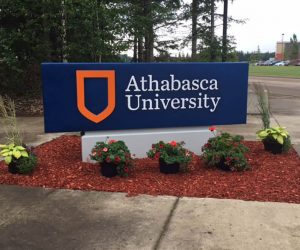 When I originally came into AU, I expected a moderate-involvement university and a distance-based online community. I had false premises for my inferences about the nature of online education. I derived false conclusions in the tacit argument. At the time, two important questions to me were “what provisions exist in contrast to in-class universities?” and “what community exists without in-person interaction?” (I’m still learning about the internal dynamics and organization for the answers to these questions.)
When I originally came into AU, I expected a moderate-involvement university and a distance-based online community. I had false premises for my inferences about the nature of online education. I derived false conclusions in the tacit argument. At the time, two important questions to me were “what provisions exist in contrast to in-class universities?” and “what community exists without in-person interaction?” (I’m still learning about the internal dynamics and organization for the answers to these questions.)
I know the nature of digital and electronic media, and their atomizing effects on individuals. I wondered a bit, in some idle moments, about the possibility for this in groups, collectives, even universities. I knew some of the statistics in terms of monetary endowment, enrollment demographics, and some of the slogans about its status as the largest online post-secondary education provider in Canada. All factual information, but devoid of first-hand content ? the details and the interesting parts of university life, for example, the people, the perspectives, and the places ?coming? to Alberta for online education.
So, I knew nothing of the individual community members, the university life online, the internal political and organizational dynamics, the influential (based on earned admiration and respect) educators and administrators (or even donors), or, in general, the major personalities in the university. (And I’m still a bit in the dark, but It’s improving.)
“How integrated and networked is this university?” I thought. Next, I needed to do some homework, some research. I set about looking for opportunities to become involved around the end of the first semester because I thought, “Why wait?”
The answer to the first question was “quite a lot,” and so there was no need to be too reticent and apprehensive in terms of the answer for the second question. This continued apace into the early and (now) middle of the second semester.
To me, it seemed a fool’s errand to twiddle my thumbs, sit on my buns, and complete course work alone without additional intellectual nourishment (or social contact with peers, or means of creative expression). I wanted more from personal educational experiences, which meant I needed to put myself out on an emotional limb to contact those within the community and become involved.
I expected, as with any internally-fuelled endeavour, hills and valleys in success and failure along the road. There would be non-response e-mails, or direct correspondence that might come off sharp-edged, but That’s part of the territory to finding the meeting points, or the meaningful contacts. I expect the bad and hope for the good, but there are no guarantees.
All of the opportunities and additional adaptations to the university would be included as time passed for me. Nothing quite surprising here, especially in terms of the expectations and vision of the university. A regular student expecting a normal university. It did not occur to the me the means a university can develop in its arsenal when specialized into the future of digital education. Let’s say a hut in the global village. (Thanks, McLuhan)
Now, I came into AU with the intention to become involved in numerous ways, but have found myself, far from the expectations, needing to invest far more energy and time into exploring the university in a very good, positive way. I had no idea, no clue, as to the level of possibilities in the university. Take, for example, the three core domains of political, research, and journalistic possibilities at AU.
For politics, I went about this in a semi-chaotic, but systematic fashion. Chaotic in choosing. Systematic once chosen. I went into the Athabasca University Student Union (AUSU) website a bit and sent letters to some people, was re-directed and found myself talking to the president of AUSU – eventually on the phone for half an hour.
For research, I contacted some AU researchers and professors. This became the opportunity for research in the Learning Analytics Research Group. Another decent opportunity to acquire some presentation, research, and collaboration skills, especially at-a-distance in the ?global village? era. I found some fellow electronic tribespeople in the process, happily.
For journalistic opportunities, I emailed many prominent and respected researchers for possible interviews in a journal that I founded and run, In-Sight: Independent Interview-Based Journal. This lead into the more concrete possibility, and general idea, of writing for the student newspaper, which turned into opportunities such as this little ditty here. This includes the first publication with the Campus Alberta Innovation Chair (CAIP) and Professor, Dr. Junye Wang, to enter into the archives of The Voice Magazine at AU.
More often than not, you might read or hear at some time in educational life that you get out what you put in. I found this to be of partial truth (sometimes), but often outright false. Not in a bad way, but in a realistic acknowledgement of the statistical likelihood of potential opportunities fit for you. In other words, one needs to acknowledge the fact of the matter, which means one might need to pivot with the failures, lean into opportunities of mutual benefit to all parties involved, and even, in some cases, choosing among competing, but equivalently desirable (for different reasons), opportunities.
A more direct perspective, from experience: how much you get out of the university will not necessarily be in proportion to the amount you put in, in fact, it might be a bit off-kilter in terms of expenditure on your own part, but That’s partly to do with personal temperament and methodology, and partly to do with openings in the varying opportunity market (volunteer and paid). Some research groups? funding terms end at the time of contact. Elections take time for student politics, and occur periodically and not sporadically. Some interviewees have been done before for freelance writers/journalists. That’s part of academic life. And after all, university is a controlled experiment, an abridged version of real life. It takes assiduous work at times and dogged persistence, and failure is more assured in the short-term, but success is more certain in the long-term (with a good work ethic and resilience).
One of the key aspects to each of the steps, and in the overall process, is self-motivation. From one student to another, as a fellow traveller, if you want to have a better educational experience, you need to become more involved, no question. It starts with you. Opportunities exist, but with effort. It is a process of give and take.
But to be unmotivated, slack on work, and not roll with the punches, or even to not try in the first place, That’s failure by definition.


